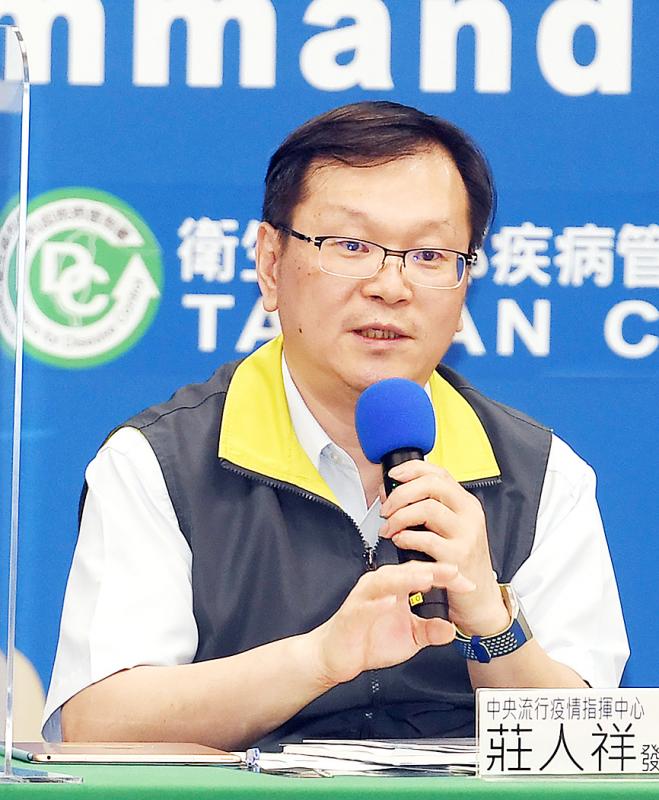The Central Epidemic Command Center yesterday announced two imported cases of COVID-19, bringing the total number of confirmed cases in the nation to 451.
Case No. 450 is a woman in her 20s who returned on Sunday from work in the US, but did not report any symptoms until two days later when she was in home quarantine, CECC spokesman Chuang Jen-hsiang (莊人祥) said.
Health authorities have identified 35 people who have had contact with the woman, including 24 needing home isolation, he said.

Photo: CNA
The other 11 are flight attendants who only need to practice self-health management, as they had adopted proper protective measures onboard, Chuang said.
Case No. 451 is a man in his 50s who had worked in Oman and returned via Dubai to Taiwan on Wednesday, Chuang said.
Authorities have identified 39 people who have had contact with the man, including 22 needing home isolation, he said.
Another 17 are flight attendants of other nationalities, he said, adding that the center would inform their respective countries through the International Health Regulation National Focal Point.
Asked about the decision by Wales and Northern Ireland on Thursday to follow England’s example in lifting the 14-day quarantine requirement for travelers from Taiwan effective yesterday, Chuang said the center welcomes the latest development, but added that overseas travel is not encouraged except for business exchanges.
Japan is reportedly planning a second-stage list of countries including Taiwan, China and South Korea that would be allowed to visit the country, but it has yet to finalize the plan, the Ministry of Foreign Affairs said.
The ministry has expressed its hope to Tokyo that Taiwan would be included, it added.
Meanwhile, the CECC said that the so-called “unknown pneumonia” outbreak in Kazakhstan reported by the Chinese embassy there might be related to COVID-19, but more details are needed.
The non-COVID-19 pneumonia outbreak caused 1,772 deaths in the first half of the year, including 628 last month, the Chinese embassy in Kazakhstan said in a statement on Thursday.
The embassy said the Kazakh Ministry of Healthcare has not defined the nature of the virus in question. The ministry has refuted Chinese media reports suggesting that the “unknown pneumonia” that is deadlier than COVID-19 is sweeping the nation.
Chuang said that while Kazakhstan’s confirmed COVID-19 cases have risen drastically since last week, it only reported a fatality rate of 0.48 percent, lower than the global average of 4.57 percent, which is somewhat questionable.
Kazakhstan’s rate of positive test results for COVID-19 has surged from 5 percent last month to 23 percent this week, which suggests that some people with minor symptoms were not identified, he added.

Chinese spouse and influencer Guan Guan’s (關關) residency permit has been revoked for repeatedly posting pro-China videos that threaten national security, the National Immigration Agency confirmed today. Guan Guan has said many controversial statements in her videos posted to Douyin (抖音), including “the red flag will soon be painted all over Taiwan” and “Taiwan is an inseparable part of China,” and expressing hope for expedited reunification. The agency last year received multiple reports alleging that Guan Guan had advocated for armed reunification. After verifying the reports, the agency last month issued a notice requiring her to appear and explain her actions. Guan

GIVE AND TAKE: Blood demand continues to rise each year, while fewer young donors are available due to the nation’s falling birthrate, a doctor said Blood donors can redeem points earned from donations to obtain limited edition Formosan black bear travel mugs, the Kaohsiung Blood Center said yesterday, as it announced a goal of stocking 20,000 units of blood prior to the Lunar New Year. The last month of the lunar year is National Blood Donation Month, when local centers seek to stockpile blood for use during the Lunar New Year holiday. The blood demand in southern Taiwan — including Tainan and Kaohsiung, as well as Chiayi, Pingtung, Penghu and Taitung counties — is about 2,000 units per day, the center said. The donation campaign aims to boost

The Kaohsiung Tourism Bureau audited six hotels in an effort to prevent price gouging ahead of Korean band BTS’ concert tour in the city scheduled for Nov. 19, 21 and 22 this year. The bureau on Friday said that the audits — conducted in response to allegations of unfair pricing posted on social media — found no wrongdoing. These establishments included the local branches of Chateau de Chine, Hotel Nikko, My Humble House, and Grand Hai Lai, it said, adding that the Consumer Protection Commission would have penalized price gougers had the accusations been substantiated. The bureau said the Tourism Development Act

The Central Weather Administration (CWA) said a magnitude 4.9 earthquake that struck off the coast of eastern Taiwan yesterday was an independent event and part of a stress-adjustment process. The earthquake occurred at 4:47pm, with its epicenter at sea about 45.4km south of Yilan County Hall at a depth of 5.9km, the CWA said. The quake's intensity, which gauges the actual effects of a temblor, was highest in several townships in Yilan and neighboring Hualien County, where it measured 4 on Taiwan's seven-tier intensity scale, the CWA said. Lin Po-yu (林柏佑), a division chief at the CWA's Seismological Center, told a news conference